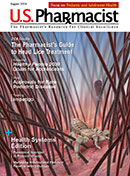A single-institution, randomized, placebo-controlled trial was conducted to evaluate the efficacy of oral cryotherapy during oxaliplatin infusions to prevent oral thermal hyperalgesia (OTH). A side effect of oxaliplatin is OTH, which results in neuropathy by causing excitability of cold-sensory nerves precipitated by sodium channels. It is thought that causing a cooling effect in those areas may decrease toxicity due to vasoconstriction.
Other studies have shown that cold caps may reduce alopecia and cold to the extremities may reduce peripheral neuropathy. If OTH is not controlled, it can cause a significant decrease in quality of life, and there are currently no established strategies to prevent it. In this study, it was shown that oral cryotherapy decreased the intensity and duration of OTH.
Patients were included in the study if they were receiving oxaliplatin full-dose for gastrointestinal malignancies (the most common malignancy being colorectal cancer, followed by pancreatic cancer) for at least four cycles. Patients were excluded if they had prior platinum therapy, dentures, or a chronic oral cavity condition. Patients were randomized 1:1 (25 patients in each arm) to either cryotherapy or no cryotherapy. Patients were given ice chips continuously during the 2-hour oxaliplatin infusion.
All patients had to complete a Leeds Assessment of Neuropathic Symptoms and Signs pain scale at baseline and with every cycle to record pain in the mouth. Oral symptoms were defined as burning, tingling, prickling, or pins and needles in the hands and feet. Patients were also asked to keep track of the number of minutes that ice chips were in the mouth and to rate how uncomfortable it was to keep ice chips in their mouths.
The primary endpoint was oral symptoms at the second cycle (after the first cycle and prior to the second cycle). Scores were used to rate the symptoms on a scale from 1 to 5, with 1 being no symptoms and 5 being the worst symptoms. Power was set at 80% in the control arm and 40% in the intervention arm using a two-sided 5% type 1 error rate. Baseline characteristics were similar in both groups. The number of patients with oral symptoms was significantly lower in the intervention arm (n =8) versus the control arm (n = 18) (P = .01). The length of time that patients kept ice chips in the mouth ranged from 60 to 120 minutes. Longer duration of ice chips in the mouth was associated with a greater reduction in oral symptoms.
Limitations of the study were that it was a very small patient population and that symptoms were reported by patients, which could be subjective. Also, patients in the intervention arm could have had a placebo effect. Future studies need to be conducted that include a larger patient population and can be blinded. Quality of life is a big determinant of survival for cancer patients, so preventing side effects is key. Oral cryotherapy can potentially decrease cold sensitivity in patients taking oxaliplatin over time.
« Click here to return to Hematology & Oncology Update.






